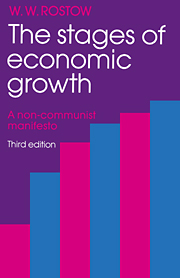Book contents
- Frontmatter
- Contents
- Preface to the Third Edition
- Preface to the Second Edition
- Preface to the First Edition
- 1 INTRODUCTION
- 2 THE FIVE STAGES-OF-GROWTH—A SUMMARY
- 3 THE PRECONDITIONS FOR TAKE-OFF
- 4 THE TAKE-OFF
- 5 THE DRIVE TO MATURITY
- 6 THE AGE OF HIGH MASS-CONSUMPTION
- 7 RUSSIAN AND AMERICAN GROWTH
- 8 RELATIVE STAGES-OF-GROWTH AND AGGRESSION
- 9 THE RELATIVE STAGES-OF-GROWTH AND THE PROBLEM OF PEACE
- 10 MARXISM, COMMUNISM, AND THE STAGES-OF-GROWTH
- Appendix A THE DIFFUSION OF THE PRIVATE AUTOMOBILE
- Appendix B THE CRITICS AND THE EVIDENCE
- Coda: REFLECTIONS ON THE DEBATE AS OF 1990
- Acknowledgments
- Index
Preface to the First Edition
Published online by Cambridge University Press: 05 June 2012
- Frontmatter
- Contents
- Preface to the Third Edition
- Preface to the Second Edition
- Preface to the First Edition
- 1 INTRODUCTION
- 2 THE FIVE STAGES-OF-GROWTH—A SUMMARY
- 3 THE PRECONDITIONS FOR TAKE-OFF
- 4 THE TAKE-OFF
- 5 THE DRIVE TO MATURITY
- 6 THE AGE OF HIGH MASS-CONSUMPTION
- 7 RUSSIAN AND AMERICAN GROWTH
- 8 RELATIVE STAGES-OF-GROWTH AND AGGRESSION
- 9 THE RELATIVE STAGES-OF-GROWTH AND THE PROBLEM OF PEACE
- 10 MARXISM, COMMUNISM, AND THE STAGES-OF-GROWTH
- Appendix A THE DIFFUSION OF THE PRIVATE AUTOMOBILE
- Appendix B THE CRITICS AND THE EVIDENCE
- Coda: REFLECTIONS ON THE DEBATE AS OF 1990
- Acknowledgments
- Index
Summary
This book is the product of both a highly spontaneous and a highly protracted effort.
Proximately, it derives from a set of lectures prepared and delivered at Cambridge University in the autumn of 1958. While there on sabbatical leave from M.I.T., I was invited by the Faculty of Economics and Politics to present views on ‘The Process of Industrialization’ to an undergraduate audience. This book emerged directly from the effort to respond to that invitation, bearing still the marks of the occasion in its informality and non-technical character.
On the other hand the book fulfils, at least ad interim, a decision made when I was an undergraduate at Yale, in the mid-1930's. At that time I decided to work professionally on two problems: the relatively narrow problem of bringing modern economic theory to bear on economic history; and the broader problem of relating economic to social and political forces, in the workings of whole societies. As a student and teacher these two questions have engaged me ever since.
Specifically, I found Marx's solution to the problem of linking economic and non-economic behaviour—and the solutions of others who had grappled with it—unsatisfactory, without then feeling prepared to offer an alternative. Over the intervening years I explored facets of the relationship: in work on Britain of the nineteenth century; in teaching American history at Oxford and Cambridge; in studies of modern Russia, China, and the United States; and in elaborating general views on the process of economic growth.
- Type
- Chapter
- Information
- The Stages of Economic GrowthA Non-Communist Manifesto, pp. xlvii - xlviiiPublisher: Cambridge University PressPrint publication year: 1991



